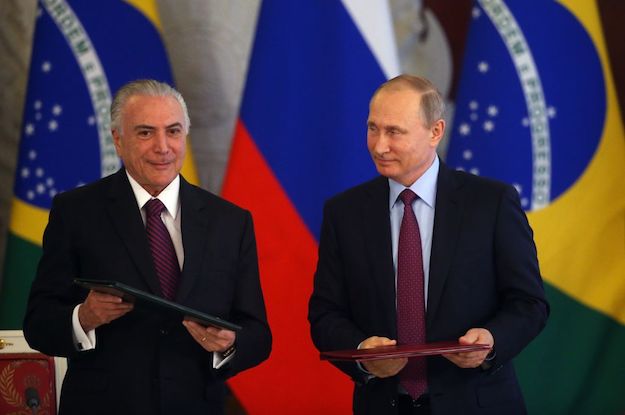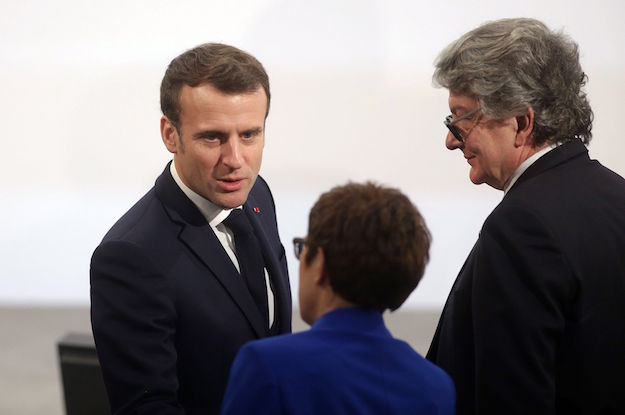When Brazil’s former President Dilma Rousseff withstood Western pressure to criticize Moscow following its annexation of Crimea in 2014, many international observers were nonplussed. Why would Brazil, one of the world’s most reliable defenders of international law, keep quiet about such a blatant violation?
At the time, most explained Brazil’s reaction as a reflection of domestic concerns. Bilateral ties between Brazil and the U.S. were already deeply strained following the NSA spying scandal, which touched Rousseff personally. Criticizing Russia could have endangered relations there, too, and jeopardized President Vladimir Putin’s pending visits to the World Cup final in Rio de Janeiro and the BRICS Summit in Brasília, both taking place that year. Rousseff, then preparing a re-election campaign, was already facing the same political pressure that would eventually lead to her impeachment; frayed ties with both Washington and Moscow would have given ample ammunition to opponents hoping to characterize her as unfit to lead.
Several of Brazil’s most seasoned diplomats opposed Rousseff’s unwillingness to criticize Russia at the time, and domestic factors certainly contributed to her position. Yet Brazil’s recent decision to again steer clear of growing tensions between Russia and the West suggests that broader geopolitical considerations also played a role, and continue to do so today.
On March 4, Russian agents operating in the UK allegedly attempted to assassinate a former Russian spy (and now British citizen) in the town of Salisbury. In the weeks since, a large alliance of Western nations has joined the UK in condemning Russia’s actions. Twenty-three countries, including France, Germany and Italy (the latter of which is seen as traditionally close to Russia) sharply criticized Moscow and expelled diplomats on top of already existing economic sanctions. U.S. President Donald Trump’s decision to go along despite his personal admiration for Putin shows how concerned his foreign policy advisers must be about what looks like a state-sponsored attack on foreign soil. In response, the Kremlin ordered 60 U.S. diplomats to leave Russia by April 5.
Brazil-Russia relations, by contrast, remain in good health. Brazil has not commented on the incident in Salisbury. A rare visa waiver program, which makes a Brazilian passport more valuable for travelers arriving at the Moscow airport than does any European equivalent, remains in place. Meanwhile, economic ties have flourished since 2014, as many Brazilian products have replaced Western ones in Russia since the U.S., the EU and others imposed sanctions.
But just as in 2014, Brazil’s strategy may have little to do with what policymakers actually think about the recent assassination attempt. Indeed, several leading diplomats have privately criticized Moscow for its alleged actions, just as they did following the Crimea annexation.
Instead, Brazil’s muted response points to the complex challenges it faces in increasingly unpredictable geopolitical circumstances, with various competing centers of power and clear signs that U.S.-led unipolarity is giving way to a new global order that cannot yet be easily defined.
In many ways, Brazil’s strategy is not new. Both during the Cold War and even during the so-called unipolar moment in the 1990s, when Washington was globally dominant, former Brazilian Presidents Fernando Collor, Itamar Franco and Fernando Henrique Cardoso shied away from fully siding with Washington (ironically, all three stand accused of having been too close to the United States despite considerable evidence to the contrary, frequently generating frustration among U.S. policymakers).
In this context, it is no surprise that Brazil’s overall foreign policy strategy, which emphasized ties to the so-called Global South during 13 years of leftist rule under the Workers’ Party, barely changed after the conservative Michel Temer became president in 2016.
Confounding expectations that Temer would weaken commitment to the BRICS grouping, his travel itinerary suggests unprecedented engagement with China, India and other members. Temer made three trips to Asia before even setting foot in Washington; no previous Brazilian president traveled to the region as often this early into his or her term.
To some extent, Temer has had little choice. Several Western leaders have skipped Brazil during recent trips to Latin America – including German Chancellor Angela Merkel, former French President François Hollande, former U.S. Secretary of State Rex Tillerson and Vice President Mike Pence. By contrast, the unpopular Temer was welcomed whole-heartedly in Russia, China and India.
All that helps to explain why, despite strong ties to the U.S. and Europe – symbolized, for example, by Temer’s decision to apply for OECD membership – Brazil should not be expected to take sides if tensions between Russia and the West intensify, regardless of who succeeds Temer in January.








